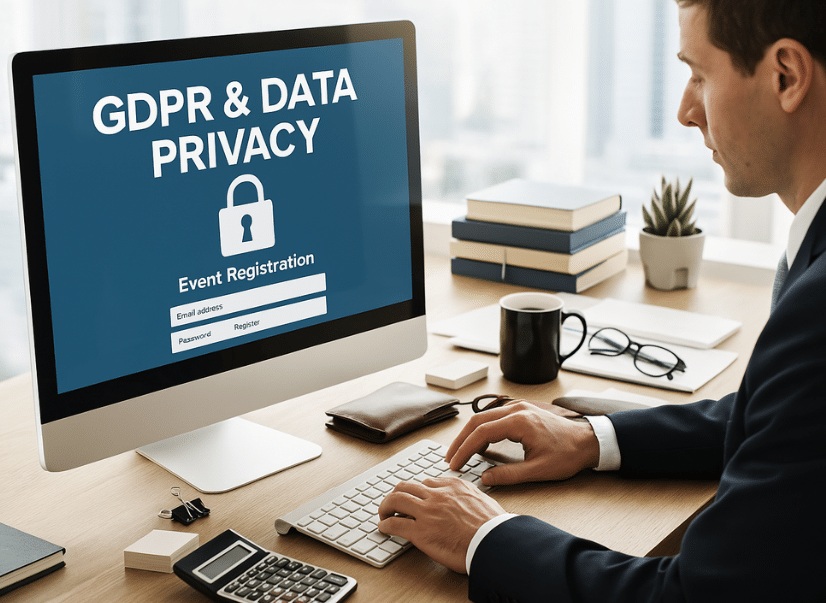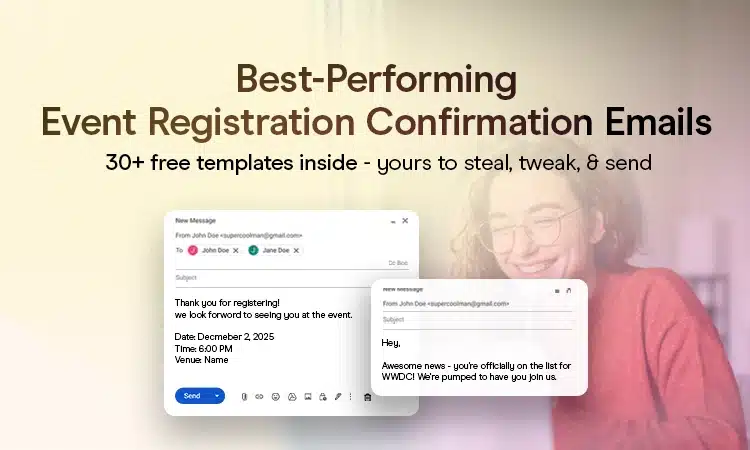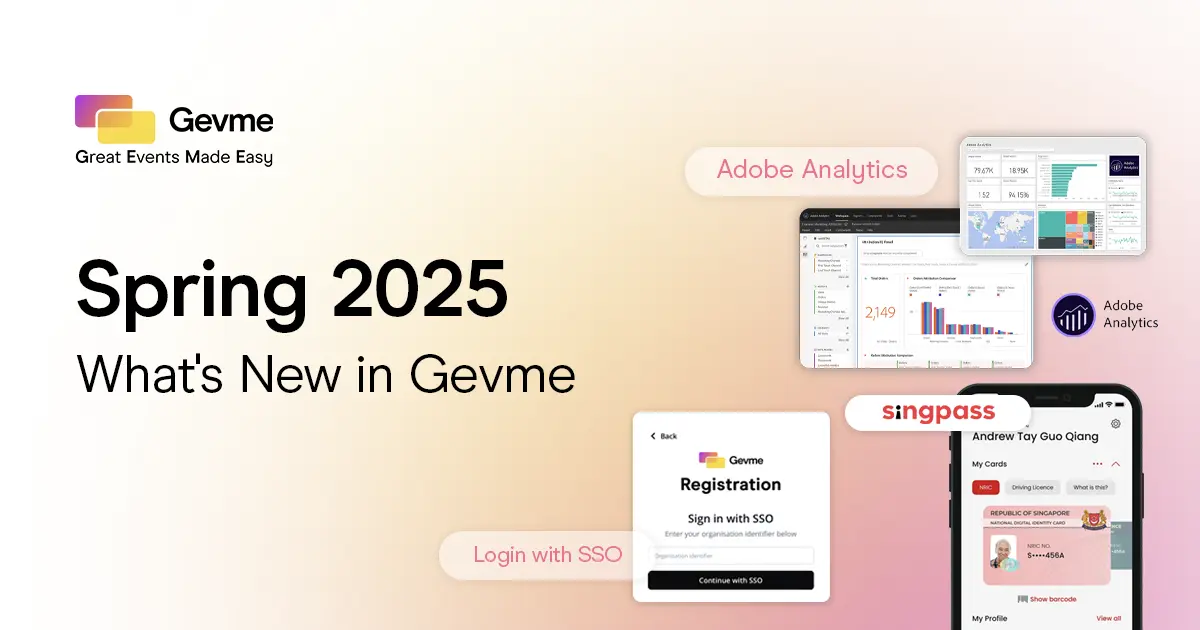In today’s digital landscape, event data privacy has become a paramount concern for event organizers and attendees alike. With data breaches making headlines and privacy concerns on the rise, attendees are increasingly cautious about sharing their details. For event organizers, this means that understanding and implementing robust event data privacy measures is more than mere legal obligation.
Understanding GDPR and Its Impact on Event Registration
The General Data Protection Regulation (GDPR), enacted in May 2018, has set a global benchmark for data privacy. While it originates from the European Union, its reach is worldwide, affecting any organization that processes the personal data of EU citizens. This includes event organizers, regardless of their location, who collect attendee information such as names, email addresses, and payment details. Non-compliance can lead to significant fines, up to €20 million or 4% of annual global turnover, whichever is higher.
Under GDPR, event organizers are classified as Data Controllers, meaning they determine how and why personal data is processed. This designation carries specific responsibilities, including ensuring that data collection is lawful, transparent, and limited to what is necessary for the event.
For example, if you’re organizing a conference and collecting attendee information through an online registration system, GDPR mandates that you:
- Obtain Explicit Consent: Clearly inform attendees about what data you’re collecting and why, ensuring they actively agree to this collection.
- Ensure Data Minimization: Only collect information that is directly relevant and necessary for the event.
- Provide Transparency: Inform attendees about how their data will be used, who it will be shared with, and how long it will be retained.
By adhering to these principles, event organizers not only comply with legal requirements but also foster trust with their attendees, demonstrating a commitment to protecting personal information.
Key Changes Introduced by GDPR in Event Registration
The General Data Protection Regulation (GDPR) has significantly reshaped the landscape of event registration by introducing stringent requirements for handling personal data. Event organizers must adapt to these changes to ensure compliance and maintain attendee trust.
Explicit Consent
Under GDPR, obtaining clear and affirmative consent from attendees before collecting their personal data is mandatory. This means pre-ticked boxes or implied consent are no longer acceptable. Attendees must be fully informed about how their data will be used and must actively agree to each specific purpose. For example, if you plan to share attendee information with sponsors, you must obtain separate consent for this action.
Data Minimization
GDPR emphasizes collecting only the data that is strictly necessary for the purposes of the event. Event organizers should evaluate their registration forms to ensure they are not requesting excessive information. For instance, if dietary preferences are irrelevant to your event, refrain from including such fields in your registration form.
Transparency
Transparency is a cornerstone of GDPR event registration. Organizers are required to clearly communicate to attendees what personal data is being collected, the reasons for its collection, how it will be used, who it will be shared with, and how long it will be retained. This information should be presented in a concise, transparent, intelligible, and easily accessible form, typically through an event data privacy notice or policy linked during the registration process.
Right to Access and Erasure
Attendees have the right to access their personal data and request its deletion, commonly known as the “right to be forgotten.” Event organizers must have procedures in place to respond to such requests promptly. This includes ensuring that data can be completely erased from all systems and that any third parties with whom the data has been shared are informed of the deletion request.
Data Portability
GDPR introduces the right to data portability, allowing individuals to obtain and reuse their personal data across different services. For event organizers, this means providing attendees with their data in a structured, commonly used, and machine-readable format upon request.
Accountability and Compliance
Event organizers must not only comply with GDPR but also be able to demonstrate compliance. This involves maintaining records of data processing activities, implementing appropriate security measures, and conducting regular audits. In some cases, appointing a Data Protection Officer (DPO) may be necessary, especially if large-scale processing of sensitive data occurs.
Impact of GDPR on Event Registration Practices
The General Data Protection Regulation (GDPR) has significantly influenced event registration practices, compelling organizers to adopt more stringent data handling procedures to protect attendee information and ensure compliance.
Revised Registration Forms
Event organizers must update registration forms to align with GDPR mandates. This includes incorporating explicit consent mechanisms, such as unticked opt-in boxes, and providing detailed event data privacy notices that outline data collection purposes and usage. For instance, the IEEE emphasizes the necessity of capturing active consent during the registration process to meet GDPR standards.
Secure Data Handling
Implementing robust security measures is crucial for safeguarding collected data. Organizers should ensure that personal information is encrypted, access is restricted to authorized personnel, and data storage complies with GDPR’s stringent security requirements. Regular audits and assessments can help maintain data integrity and prevent unauthorized access.
Staff Training
Educating event staff about GDPR compliance is essential. Training programs should cover data protection principles, attendee rights, and the organization’s policies on data handling. By fostering a culture of awareness, staff can effectively manage personal data and respond appropriately to data-related inquiries or incidents.
Best Practices for GDPR-Compliant Event Registration
To navigate the complexities of GDPR in event registration and uphold attendee trust, event organizers can adopt the following best practices:
Transparent Communication
Clearly inform attendees about the data being collected, its intended use, and any third parties with whom it will be shared. Transparency fosters trust and ensures that attendees are fully aware of how their information is handled.
Efficient Data Management
Establish protocols for data retention and timely deletion post-event. Collect only the information necessary for event purposes and avoid retaining data longer than required. Regularly review and purge outdated or unnecessary data to minimize risks associated with data storage.
Regular Compliance Audits
Conduct periodic reviews of data processing activities to ensure ongoing adherence to GDPR standards. Regular audits help identify potential compliance gaps and provide opportunities to address issues proactively, maintaining the organization’s commitment to data protection.
Gevme: GDPR-Compliant Event Registration
Ensuring compliance with GDPR in event registration can be complex, but platforms like Gevme have integrated features designed to simplify this process for organizers.
Customizable Consent Management
Gevme allows event organizers to tailor registration forms to include explicit consent options, ensuring attendees are fully informed about data collection practices. This customization aligns with GDPR’s requirement for clear and affirmative consent.
Data Minimization and Secure Storage
The platform emphasizes collecting only essential attendee information, adhering to GDPR’s data minimization principle. Additionally, Gevme employs robust security measures, including encryption and regular audits, to protect personal data. Their compliance with standards such as ISO 27001 and SOC 2 demonstrates a commitment to data security.
Transparent Data Handling
Gevme provides clear event data privacy policies detailing data usage, retention periods, and sharing practices, fostering transparency and trust with attendees. Organizers can access these policies to ensure their events meet GDPR standards.
Challenges in Implementing GDPR-Compliant Registration
Event organizers may frequently encounter these challenges in fully implementing GDPR-compliant registration processes:
Resource Allocation
Achieving compliance requires dedicating resources to update systems, train staff, and monitor adherence to GDPR standards. Smaller organizations may find this particularly demanding.
Evolving Regulations
Data protection laws continue to evolve, necessitating ongoing education and adaptation. Staying informed about changes and adjusting practices accordingly is essential for maintaining compliance.
Balancing User Experience and Compliance
Designing registration processes that are both user-friendly and compliant can be challenging. Ensuring that consent requests and data collection methods are straightforward without causing attendee frustration requires careful planning.
Navigating GDPR compliance in event registration is complex, but with Gevme’s robust, GDPR-compliant event registration solutions, you can simplify the process while ensuring event data privacy.
Discover how Gevme can support your event registration needs.








